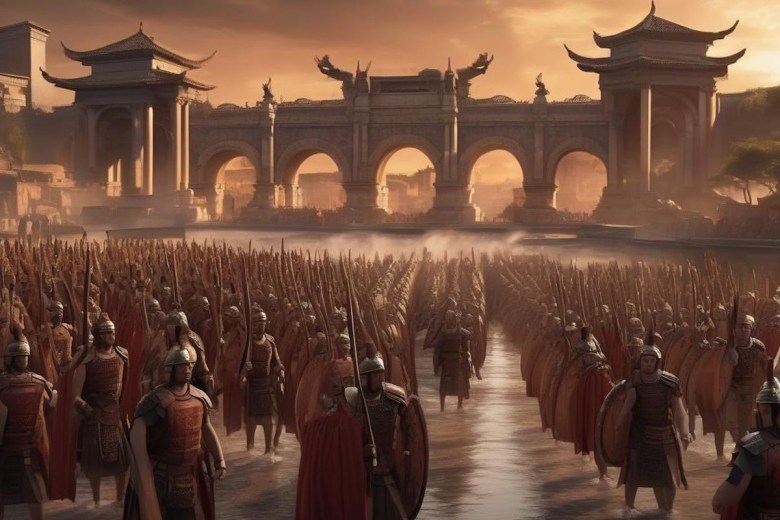Science
Exploring the Divergent Paths of Ancient Rome and China

A recent speech titled “First Notes on Geo-Philosophy” was delivered at the First World History Frontiers Forum held on September 12, 2025, in Beijing, organized by the Chinese Academy of Social Sciences. The address, published by the Appia Institute, explored the contrasting historical trajectories of ancient Rome and China, emphasizing the influence of geography and social structures on their development.
The differences between ancient Roman and Chinese civilizations, as noted by philosopher Feng Youlan a century ago, stem from their distinct geographical environments. The Roman Empire thrived around the Mediterranean Sea, an area that had been shaped by the navigational skills of previous cultures like the Greeks and Phoenicians. The Romans initially had to secure dominance over the Italian peninsula to expand their influence across the Mediterranean. Their naval vessels featured rowers who operated in unison, embodying a culture of equality and cooperation. Disruption within their ranks could spell disaster, whether on water or in battle formations like the phalanx, which was fundamental to their military success.
In contrast, ancient China’s geographical landscape was largely enclosed. With harsh terrains to the north, west, and south, and a vast ocean to the east, the region posed significant challenges that required organized, long-term planning. Control over the land necessitated a hierarchical structure, where authority governed the execution of vital tasks such as managing river systems and clearing forests. In this environment, nature was stable but demanding, leading to the creation of a robust bureaucratic system that prioritized loyalty and centralized power.
The political structures of both civilizations also diverged significantly. In ancient Rome, leaders such as consuls served in succession, designed to correct potential missteps of their predecessors. This model proved effective, enabling the Greek League to overcome the formidable Persian Empire. The Roman legion operated similarly to a private equity firm, where members shared spoils according to rank and contribution. In contrast, the Chinese system emphasized a clear social hierarchy, where the emperor wielded significant power, governing through a framework of loyalty and duty. The ruler’s downfall could lead to societal collapse, making his role crucial to the stability of the state.
The philosophical discourse in ancient China during the fourth and fifth centuries BCE further illustrates these differences. Mozi, a prominent philosopher of the time, critiqued various schools of thought, advocating for a balance between power and organization in governance. He opposed aggressive expansionism, suggesting that a return to a religious-political authority could ensure stability among states. Unlike the Greek phalanx or Roman legion, there was no concept of an army of equals in China. Instead, military organization relied on hierarchical structures, with loyalty to the emperor paramount.
The cultural narratives surrounding warfare and heroism also set these civilizations apart. In Greece and Rome, the pursuit of a noble death in battle was celebrated, as exemplified by the epic tales of heroes like Achilles. Conversely, Chinese philosophy emphasized the preservation of life, reflecting a pragmatic approach to conflict. The concept of yang sheng, or nourishing life, underscored a different value system, prioritizing individual survival over the glory of a heroic demise.
While Rome’s economy thrived on conquest and plunder, China’s wealth was primarily derived from agriculture and industry. This distinction shaped their approaches to war, with Chinese strategies often aimed at resource acquisition rather than sheer territorial expansion. The unity of the Mediterranean was a singular achievement, while the recurring theme of unification in Chinese history highlighted a persistent quest for stability and continuity.
In reflecting on these divergent historical paths, it is evident that geography and social organization played pivotal roles in shaping the political and philosophical landscapes of each civilization. The exploration of these themes invites contemporary discussions on how to reconcile these two distinct histories. As Feng Youlan suggests, our understanding of the past is intrinsically linked to our geographical and historical contexts, offering valuable insights into the complexities of human civilization.
-

 Business5 months ago
Business5 months agoKenvue Dismisses CEO Thibaut Mongon as Strategic Review Advances
-

 Lifestyle4 months ago
Lifestyle4 months agoHumanism Camp Engages 250 Youths in Summer Fest 2025
-

 Sports4 months ago
Sports4 months agoDe Minaur Triumphs at Washington Open After Thrilling Comeback
-

 Sports5 months ago
Sports5 months agoTupou and Daugunu Join First Nations Squad for Lions Clash
-

 Top Stories5 months ago
Top Stories5 months agoColombian Senator Miguel Uribe Shows Signs of Recovery After Attack
-

 World5 months ago
World5 months agoASEAN Gears Up for Historic Joint Meeting of Foreign and Economic Ministers
-

 Health4 months ago
Health4 months agoNew Study Challenges Assumptions About Aging and Inflammation
-

 Business5 months ago
Business5 months agoOil Prices Surge Following New EU Sanctions on Russia
-

 Entertainment4 months ago
Entertainment4 months agoDetaşe-Sabah Violin Ensemble Captivates at Gabala Music Festival
-

 Entertainment4 months ago
Entertainment4 months agoBaku Metro Extends Hours for Justin Timberlake Concert
-

 Top Stories5 months ago
Top Stories5 months agoRethinking Singapore’s F&B Regulations Amid Business Closures
-

 Business5 months ago
Business5 months agoU.S. House Approves Stablecoin Bill, Sends to Trump for Signature









